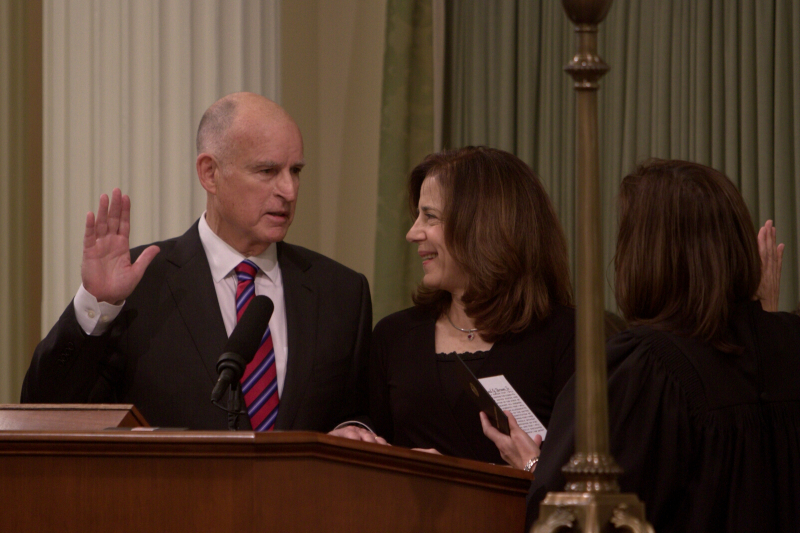The governor challenged the state, already a leader with far-reaching environmental laws, to set new goals for 2030 and beyond.
In the next 15 years, he proposed the state increase renewable electricity sources from one-third to 50 percent, reduce petroleum use in vehicles by 50 percent and double the efficiency of existing buildings.
"We must demonstrate that reducing carbon is compatible with an abundant economy and human well-being," he said.
The inauguration was held in the Assembly chamber at the state Capitol.
Jerry Brown held office from 1975 to 1983 before term limits, and returned for a third term in 2011. He defeated Republican challenger Neel Kashkari in a landslide re-election victory in November.
A private reception will be held Monday evening at the California Railroad Museum, funded by private donations left over from his previous inauguration, for which he spent just $75,000. The governor's staff expects he will spend a similar amount this time.
Nancy McFadden, the governor's executive secretary, told a crowd last month at a policy conference on California's future that keeping his economic priorities may not be bold but it remains difficult.
"If we stay on course — and that's going to be no small feat — that means not creating a lot of new," McFadden said. "It means recognizing that the things we do in government cost even though they're not new and pretty. And that's really hard because there are endless needs in this state, there's endless imagination and there's 120 legislators."
However, one project the governor supports with a big price tag is a bullet train.
Brown's push for the $68 billion rail project remains controversial even as the California High-Speed Rail Authority commemorates the start of construction for the nation's first high-speed train system at a ceremonial groundbreaking in Fresno. Brown is scheduled to attend the ceremony Tuesday.
After receiving initial federal funding, the project faces a blackout from the Republican-dominated House of Representatives. But Brown has secured a source of ongoing state funds from the state's cap-and-trade pollution fees.
On Friday, Brown will release his budget proposal for the coming year, with major decisions expected on higher education funding and likely using a record influx of tax revenue to pay down debt service and retirement obligations.
Brown hasn't revealed how he'll handle recent tensions with the University of California Board of Regents, which approved tuition increases as much as 5 percent each of the next five years unless the state approves more money for the 10-campus system.
To date, Brown and Republican Earl Warren are the only California governors to serve three terms. Warren was elected to his third term in 1951 and resigned in 1953 to serve on the U.S. Supreme Court. Brown's father, Pat Brown, ran for a third term but was defeated by Ronald Reagan in 1966.
